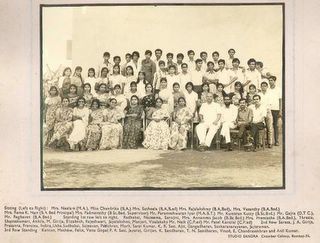“Your thoughts aren’t written words”
“Your thoughts aren’t written words,” said my English teacher in college.
I was a science student then and English classes were a joke for us budding scientists and engineers. At least, that’s what we thought about the essay under discussion in our English textbook. Certainly we could write better than those hackneyed pen pushers could. But we indulged her because of her pretty looks, friendly demeanor, and the way she teased our brains, not to say our other senses.
The discussion was about why some people are so arrogant and think they can write better but do not put pen to paper. These people often viciously run down a written work, saying they “think” they can write better than any author can.
The teacher had earlier asked us to comment on a famous author’s essay that was in our textbook in college. She also asked what we thought about the author as a writer. We were all into Ayn Rand, Harold Robbins and even JD Salinger and thought we were literary geniuses. “Harold Robbins” was heady stuff with his characters’ sex and promiscuity, Ayn Rand stoked our ambitions to be world changers and JD Salinger, well, JD Salinger, we read because everybody said we should.
“I think I can write better than him any day,” said one hotshot blood rushing to his head.
“You “think” you can. But that is a thought. Your thoughts aren’t written words. Why don’t you sit down and write a better essay and show us?” Said the pretty Shanti Narasimhan.
That brings me to the point I want to make here.
When somebody writes something there would be hundreds, no millions, who “think” they can writer better than the writer, the hapless one who ventured into the wide world of written words. But that is just a “thought” and remains in the realm of fantasy, ideology, and dreams.
As an analogy if you can picture a beautiful painting in your mind can you draw and paint it too? Isn’t it that too simple to be true? Imagine it in the mind and, lo and behold, it is on canvas and you are a famous painter. If everybody could do that everybody would be Miachaelangelo and Rembrandt. Likewise if everybody could imagine that novel in their mind they would become great writers like Shakespeare and William Faulkner.
But the sad fact is that is not the way it is. Not everybody is Michaelangelo and William Faulkner and not every person who thinks he or she can write is a writer. Nor can they transfer their “thought” by way of motor nerves to the finger tips, coherently think and write it down and polish it enough to be read by the hawk-like eyes of the reading millions. Not everybody has the mind-to-hand co-ordination to write even a grocery list without mistakes.
No sir, if you can’t do that, then what you think remains in the realm of thought and not in the realm of “written words” and published articles. Accept it as writing’s bitter truth.
Now imagine what happens when an author works hard on his manuscript and his work is published and he gets some amount of grudging recognition.
“I “think” I can write better than him. I can write circles around him, any day.”
“I “think” he is a poor writer. I could have done better.”
“He absolutely can’t freaking write. I can “think” better than he can. I have better ideas. I would have written that piece, if I had the time.”
The learned community called reviewers just destroys hours of concentrated labor with remarks like “absolute tripe,” “not worth the money,” and “so and so should stop writing.”
All this is accompanied by a lot of jealousy, many snipings, daggers to the back of the author, and a lot of smirking. But remember the parenthetical word “think” in the above sentences. Your thoughts were just “thoughts” not “written words.” Because you didn’t sit down to create something out of nothing.
It is only when you sit down, make the fingers move, take that important step to organize your thinking, side-step the verbal pitfalls, the grammatical chasms, the lurking dangers of syntax — into which a less experienced writer can fall — is the time you learn that writing is difficult and you need a lot of experience to write well.
One thing a writer has to realize is the fact that all his or her work will be judged by people who are poor writers who mistakenly think they can write better. A writer has to blank out this potentially dangerous army of critics to progress in his or her career.
We are living in desperate times for writers. If you send your manuscripts to publishers or agents, remember, the people looking at it already think they can write and “think” better than you. So you have to be absolutely, undoubtedly, brilliant to impress them.
Even if the poor and harried writer makes some progress, is published by some publisher at last, there will be people who say, “He or she can’t write.” They said it about Tom Woolf, a writer I consider one of the best writers alive. They will say it about you, too, when you are published. Don’t let it deter you.
At that time remember to say to yourself, “People, your thoughts are just thought. They aren’t written words. I wrote it and that makes all the difference.”













